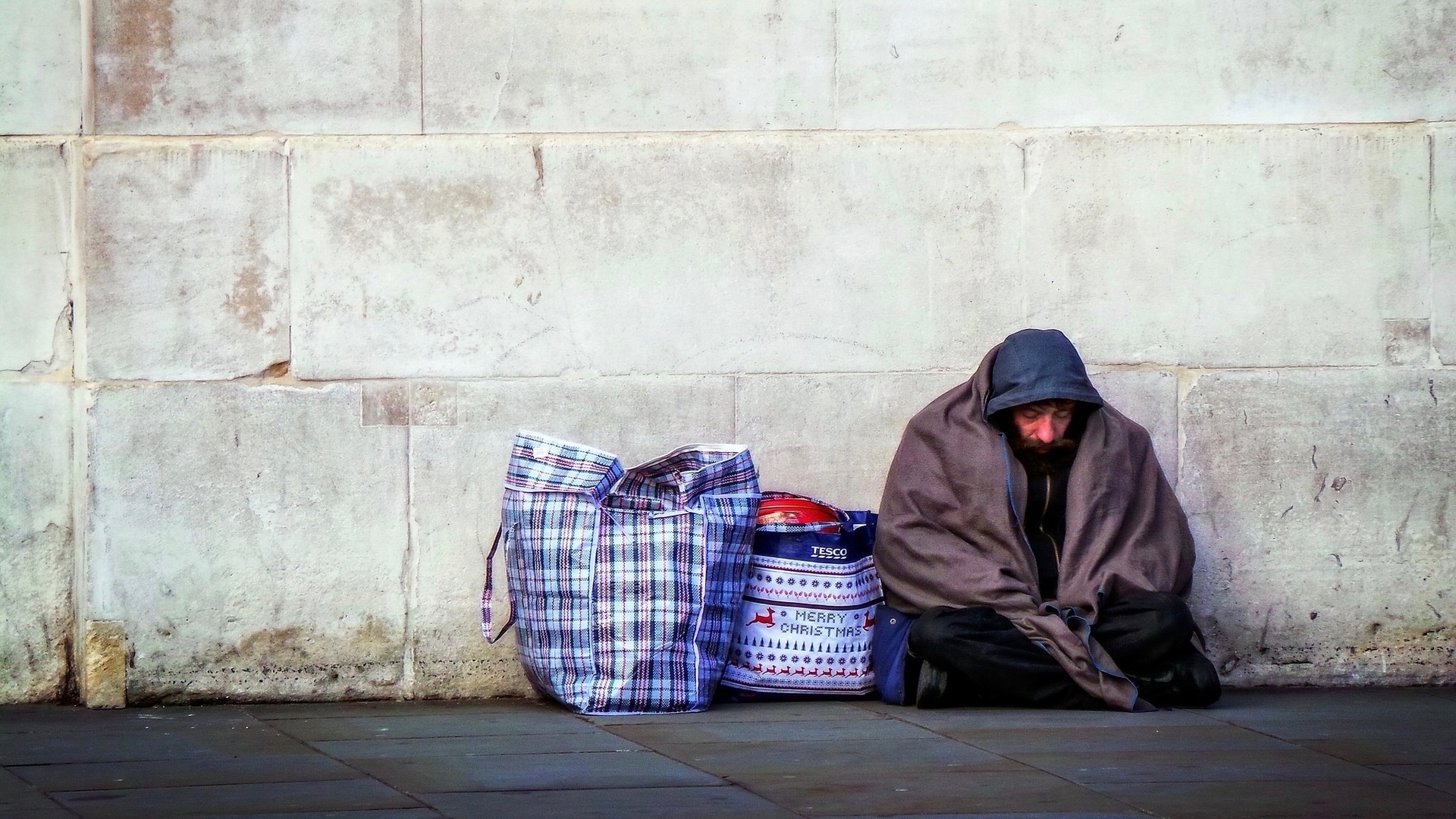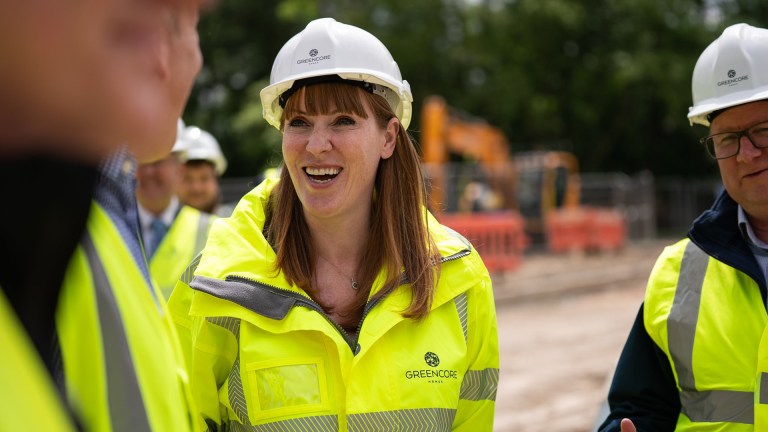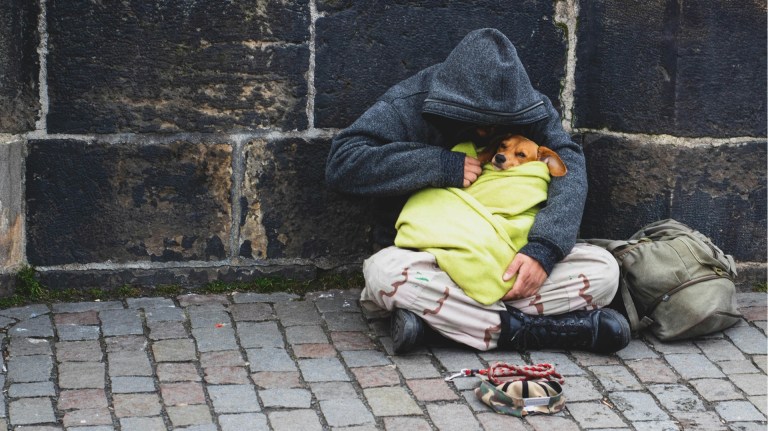Crisis has also worked with several unlikely partners to take on the unique issues thrown up by the Covid-19 pandemic. The charity teamed up with Tesco Mobile to distribute 2,500 handsets and data packages to help people keep in contact and even joined forces with Wimbledon organisers to redistribute 2,400 towels when the tennis tournament was called off.
In 2021 — and the years ahead — Crisis is calling for continued investment in housing benefit and social housing, as well as a national roll out of the Housing First approach to homelessness. Taking that action could prevent as many as 60,000 people from falling into homelessness over the next decade, according to the charity’s projections.
Crisis chief executive Jon Sparkes said: “We’re now at a crucial point where homelessness could either skyrocket over the next decade or can be brought down with similar bold action to what we’ve seen this year.
“Hundreds of thousands of people are set to spend Christmas without a home – this is heart-breaking. We know that with concerted efforts, such as continued investment in housing benefit, and longer-term solutions such as building more affordable homes, we can change this.”
Shelter: ‘We’ll keep fighting’
The housing charity’s call for leaders to ramp up house building has been persistent throughout 2020 and will, no doubt, continue in 2021 as the UK’s housing crisis shows no sign of ending.
Shelter is clear on where the solution to homelessness in the UK lies but the social housing revolution that the organisation has long called for has not arrived with just 6,566 social rent homes completed in England between March 2019 and April 2020.
Advertising helps fund Big Issue’s mission to end poverty
In the meantime, Shelter was at the forefront of efforts to protect people experiencing homelessness throughout the pandemic — lobbying the government to fund the Everyone In scheme and ban evictions — and saw demand for their services skyrocket. Shelter’s emergency phone line received calls from almost 25,000 people between October and November, the charity told The Big Issue, and it is braced for that demand to increase over the winter months.
Shelter’s campaigning also extended to the courts where the charity’s legal team won two landmark legal cases that proved refusing to rent to someone because they need housing benefit is unlawful.
Shelter’s work in 2021 will focus on ensuring property firms uphold the law as well as campaigning for the benefit cap to be scrapped. The charity is also urging the Government to tell councils to provide safe accommodation for anyone facing the streets and has warned of rising homelessness in the UK when evictions by bailiffs continue in England in January.
But the big long-term goal remains securing investment in housing. The Government pledged £12bn for its Affordable Housing Programme in the autumn — one of the only long-term funding commitments it’s made on housing — but Shelter wants to see that money translated into affordable homes quickly.
Polly Neate, Shelter chief executive, said: “We’ll keep fighting for it to be spent not on so-called ‘affordable homes’ that aren’t affordable at all, but on the new generation of social homes we need to end homelessness and the housing emergency for good.”
Advertising helps fund Big Issue’s mission to end poverty
St Mungo’s: ‘Go beyond one-year settlements’
St Mungo’s was right at the forefront of the Everyone In scheme which saw rough sleepers and vulnerable people protected from the Covid-19 pandemic in hotels and emergency accommodation.
The work saw the charity manage 29 hotels during the first national lockdown with rooms, meals and support all provided in the space of just a few weeks.
While the successes of 2020 were about the short-term, St Mungo’s focus in 2021 is on the long-term solutions to homeless in the UK.
The charity told The Big Issue the UK’s benefit system and local housing allowances need to work for the poorest in society. Many people will lose their homes when protections against evictions end in spring 2021, the charity warned, unless solutions are found.
St Mungo’s has vowed to work with local and national government towards long-term solutions for homelessness. That work is already underway, the charity has said, citing the Next Steps and Rough Sleeping Accommodation programmes that are pivotal to moving rough sleepers protected in the pandemic into permanent, secure homes.
Steve Douglas, St Mungo’s chief executive, said: “We saw what can be done when there is a concerted multi-agency response, with the right funding, to help people who are sleeping rough or experiencing other forms of homelessness.
Advertising helps fund Big Issue’s mission to end poverty
“The Government’s further commitment to end rough sleeping and the affirmation that this issue is a priority is positive and welcomed, and it must be a focus for 2021, beyond one-year settlements.”
Emmaus: Focus on preventing homelessness
Emmaus spent 2020 coming up with smart short-term solutions to homelessness in the UK and the difficulties families have faced throughout the Covid-19 pandemic.
As well as expanding the number of rooms available in Emmaus communities to more than 850, the charity also launched People’s Pods in Salford to offer people experiencing street homelessness a safe place to sleep, a bathroom, access to mains electricity and support from the community.
Emmaus also provided temporary accommodation for rough sleepers in Merseyside and Mossley, near Manchester, as part of the wider Everyone In scheme.
The charity’s efforts in north-west England weren’t limited to aiming to end homelessness. Emmaus continued to run three social supermarkets throughout lockdown and launched a school uniform hub to help families hit by the pandemic.
For 2021, all Emmaus’ focus is on preventing people slipping into homelessness during the uncertainty that both Brexit and Covid-19 have created. With the economic fallout from Covid-19 continuing to bite, the message from Emmaus is clear: a plan needs to be put in place now to protect people made vulnerable by the pandemic and at risk of losing their home.
Advertising helps fund Big Issue’s mission to end poverty
Centrepoint: ‘End youth homelessness in the long-term’
Youth homelessness charity Centrepoint has been much in demand in 2020.
The Covid-19 pandemic has hit young workers hard thanks to the impact on the hospitality and retail sectors. In October, the London School of Economics found 11 per cent of people between 16 and 25 had lost their job in the two months prior.
That can be seen in growing demand for Centrepoint’s services with more people requiring support at hostels in London, Yorkshire and the North East and advice from the charity’s preventative service in Greater Manchester. The Centrepoint helpline has fielded more calls too, rising by 50 per cent when compared to previous years, the charity said.
Paul Noblet, head of public affairs at Centrepoint, said: “To have been able to keep our services open and covid-safe for the hundreds of young people we support every night has been a huge achievement in itself, and is a credit to our team both on the frontline and behind the scenes.”
The charity is not expecting demand to slow down going into 2021. To end homelessness in the UK, Centrepoint is calling for the temporary £20 increase in Universal Credit to be made permanent as well as the Government’s Kickstart employment scheme to reach all youngsters who need it. Kickstart promises funding for employers to create job placements for 16 to 24 year olds on Universal Credit.
Noblet added: “We should be under no illusion that 2021 will bring respite from the surge in demand for support from homeless young people.
Advertising helps fund Big Issue’s mission to end poverty
“To end youth homelessness in the long-term we need the government to commit to a sustained level of funding well into the middle of this decade to guarantee both age-appropriate services to tackle rough sleeping.”
Zacchaeus 2000 Trust: ‘End two-tier discrimination’
Zacchaeus 2000 Trust (Z2K) has been campaigning for benefits to be enough for people to live on in a year when millions of people were forced to turn to Universal Credit.
The benefit system has come to the aid of 5.8 million people in 2020, many of whom applied after losing their job during the Covid-19 pandemic.
But Z2K has warned of rising homelessness in the UK if benefit payments cannot keep up with the cost of living.
Like other poverty tackling organisations, Z2K wants the £20 increase to Universal Credit to continue beyond April 2021. That increase should go further too. Nearly two million disabled or seriously unwell people who Z2K say are still claiming employment support allowance should also receive the boost.
Ending this “two-tier discrimination” — as Z2K has called it — would be a big step towards preventing rising homelessness in the UK.
Advertising helps fund Big Issue’s mission to end poverty
Marc Francis, Zacchaeus 2000 Trust’s director of policy & campaigns, said: “Like everyone else, Z2K’s overriding wish for 2021 is for the rapid roll-out of the vaccine to stop the terrible toll this virus is taking, especially on the most vulnerable.
“But we also hope ministers will reflect over Christmas whether they really are doing enough to protect those who were struggling long before the pandemic broke.”










